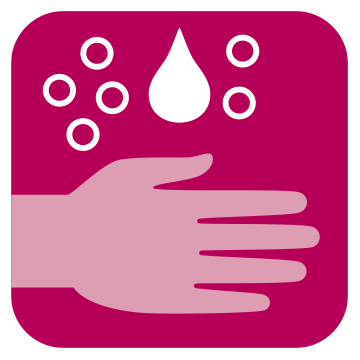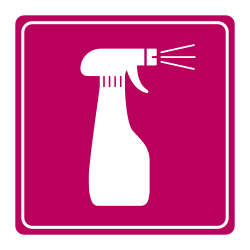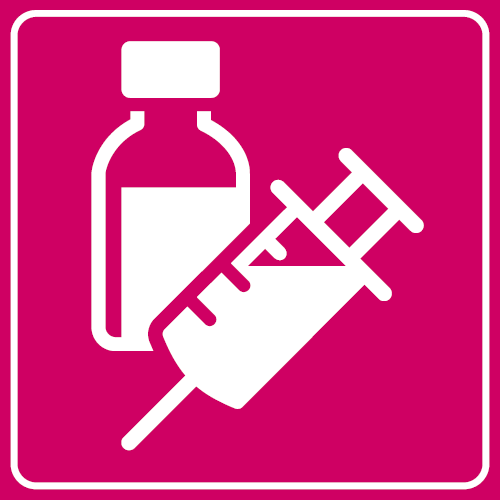Updated 6 July 2022
In her management of the coronavirus crisis, the University of Geneva applies the recommendations of Federal and Cantonal authorities, in particular those of the cantonal doctor, derived from those of the Federal Office of Public Health (FOPH). These are the only health authorities to which it refers.
For any intern question related to the UNIGE policy, please send an e-mail to steps(at)unige.ch.
Dispensers of hydroalcoholic solution and disinfectants are available at the entrances of the buildings for the entire community.
Disinfection materials and surgical masks are distributed free of charge to staff members who request them. > Details of distribution methods
People at especially high risk may benefit from additional protective measures at work. If their presence on site is essential, their working conditions should provide them with protection equivalent to that which they would enjoy if they were working from home. The workplace shall be arranged in such a way that close contact with other persons is excluded, for example by providing a separate office. The persons concerned may refuse to perform an assigned task if the protective conditions on site are not sufficient.
If vulnerable employees are unable to carry out their normal work duties from home, they will be assigned equivalent alternative tasks by their managers, which they may carry out at home, even if they differ from those in their job description. Otherwise, vulnerable persons are temporarily released from the obligation to work, without any reduction in salary. Decisions on each case are made in agreement between the employees concerned and their superiors.
When people are fully vaccinated, they are no longer considered vulnerable and the employer is no longer obliged to give them additional protection at work.
 Respect the barrier gestures.
Respect the barrier gestures.
Wash your hands frequently, with soap and water as a priority or with a hydroalcoholic solution. Cough and sneeze into a handkerchief or the crook of your elbow, then throw the handkerchief in the bin. Avoid direct contact (handshakes, hugs). The UNIGE provides all members of its community with hydroalcoholic solution at the entrances to the buildings. > Washing hands
![]()
Air the premises regularly.

Clean work surfaces
Disinfect your workplaces at the Library before and after each use. Disinfect shared facilities before and after use (shared printers, meeting rooms, laboratories, boxes and desks) and personal offices as required. Disinfectants (disinfectant wipes, liquids and sprays) are available for staff.

Vaccination is recommended
> To get vaccinated in Geneva, with or without an appointment
Positive testing
People who test positive are no longer subject to a period of isolation. If they do not show symptoms, they may nevertheless prefer to work from home for a few days, in agreement with their superiors and provided that the needs of the service allow it. If they have symptoms, as with any other illness, they are entitled to standard sick leave and a medical certificate is required.
If you have symptoms or test positive, it is your personal responsibility to wear a mask in enclosed spaces, reduce your social life and avoid contact with people at high risk. > Cantonal authorities' recommendations in case of symptoms or positive testing
Quarantine
If you are quarantined while on holiday abroad, your holiday is cancelled from the day of quarantine and you are granted special leave "quarantine-related health confinement" which you can select in GDA.
If the duration of the quarantine exceeds the duration of the planned holiday, the remaining time is taken from the overtime or holiday balance. If they are insufficient, a salary reduction will be made according to the number of days of absence. The quarantine of a relative (e.g. child) during the holidays does not suspend the taking of holidays.
Teaching at UNIGE takes place in person.
The class contents for the 2022 spring semester is made available remotely using the most appropriate tools for each class such as streaming, recording, sharing documents on moodle or exchanging notes. Teaching is not designed in a hybrid format. This is a one-off assistance.
As of 1st April 2022, the free UNIGE testing sites at Uni Mail, Sciences II and CMU are permanently closed.
As of 1st June 2022, self-testing saliva test kits are no longer available in the welcome desks of the main buildings for asymptomatic students and staff who wish to be tested.
In case of symptoms, it is still recommended to go for testing in the various centres in the canton of Geneva, which remain free of charge for those who are ill. > Getting tested in Geneva
Incoming and outgoing exchange students
For information on the impact of the pandemic on the conditions of academic mobility and the guidelines for exchange students, read more on the Mobility reference page.
Traveling abroad
We strongly encourage staff members and students to seek information from the destination country's embassy or consulate before traveling abroad. In all cases, staff members and students must be sure to comply with the hygiene and behavior rules issued by the federal and cantonal public-health authorities.
All members of the academic community must be aware of UNIGE's policy on high-risk regions.
Return to Switzerland
For the conditions of return to Switzerland, please refer to the requirements of the Swiss Confederation.
Wearing a mask is not compulsory on university premises. Those who wish to do so may continue to use them freely.
Teachers and hierarchies cannot require their students and staff to wear masks except under special circumstances, for example in rooms within hospital or care amenities.
25 May 2022: recommandations du service du médecin cantonal concernant le port de masque, destinées aux prestataires de soins
29 June 2022: obligation du port du masque aux HUG
> Get vaccinated in Geneva
Within the limits of the needs of the service, hierarchies authorise appointments during working hours without the need to declare an absence in GDA.
Teachers are asked to show tolerance towards students who should be vaccinated during class time, by excusing their absence.
Significant efforts have been made to improve the quality of the air at UNIGE and will be pursued in the long term to protect everyone's health. The air renewal rate of classrooms and auditoriums has been measured for over a year throughout all the University buildings, in collaboration with the Cantonal Buildings Office (OCBA). This campaign led to the adoption of several corrective measures, ranging from early maintenance to the installation of new installations. CO2 measurements have also been carried out with the State Health Service, showing levels in line with standards.
Additional ad hoc measurements can be carried out on request by the Service santé au travail, environnement, prévention et sécurité (Steps). Finally, we stress the importance of regular natural ventilation by opening doors and windows whenever possible.
